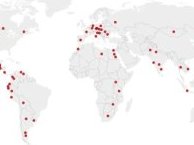Articles in English

The Monitor | 13-Oct-2021
A Canadian company’s successful challenge to a precautionary mining ban in Colombia shows how little investor–state dispute panels care about the right to regulate.
The Guardian | 11-Oct-2021
In pursuit of growth in Africa, British American Tobacco and others use intimidatory tactics to attempt to suppress health warnings and regulation, including accusing governments of breaching trade agreements.
United Nations | 8-Sep-2021
The Working Group recommends that States terminate or reform urgently all existing international investment agreements.
keywords:
human rights ,
investor-state disputes | ISDS
Globalization and Health | 8-Sep-2021
Given the potential for wider use of the ISDS mechanism, strategies to protect public health policy space in the context of both international trade and investment treaty and dispute settlement contexts remain important.
Mexico News Daily | 7-Sep-2021
Houston-based Talos Energy intends to fight the decision by the Energy Ministry to designate the state oil company Pemex as the operator of the Zama field, which contains almost 700 million barrels of oil.
Mint | 7-Sep-2021
Cairn Energy will drop litigations to seize Indian properties in countries ranging from France to the US, within a couple of days of getting a $1 billion refund resulting from the scrapping of a retrospective tax law.
Cortec v Republic of Kenya: Cautionary tale on local due diligence for international mining projects
Mining Law Canada Blog | 6-Sep-2021
These decisions have the potential to significantly impact companies with current and future mining and development licences where there are questions around environmentally sensitive areas.

| 6-Sep-2021
The map is an interactive tool that brings together 60 significant ISDS cases globally to support social movements, researchers, journalists and policy makers to analyse the impact of the ISDS mechanism.
keywords:
investor-state disputes | ISDS
Vanguard News Nigeria | 2-Sep-2021
AfCFTA roundtable brought together business leaders, academia, government representatives, trade, and legal experts to discuss and deliberate on dispute issues in implementing the agreement in Nigeria.


